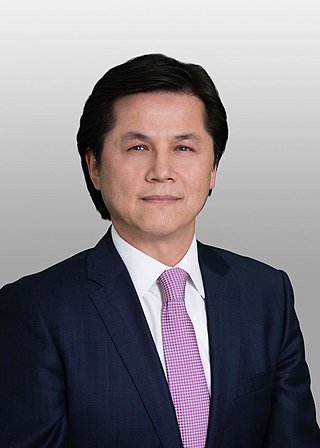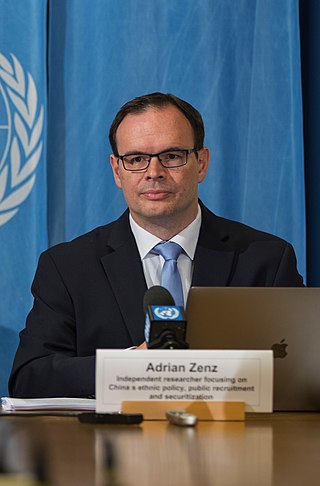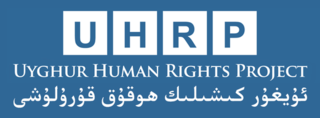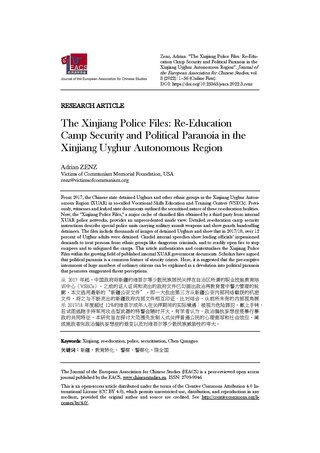Human rights in China are periodically reviewed by international bodies, such as human rights treaty bodies and the United Nations Human Rights Council's Universal Periodic Review. The Chinese Communist Party (CCP), the government of the People's Republic of China (PRC), their supporters, and other proponents claim that existing policies and enforcement measures are sufficient to guard against human rights abuses. However, other countries, international non-governmental organizations (NGOs) including Human Rights in China and Amnesty International, and citizens, lawyers, and dissidents inside the country, state that the authorities in mainland China regularly sanction or organize such abuses.
Tohti Tunyaz, also known by the pen name Tohti Muzart, was an ethnic Uyghur historian and writer who graduated from the history department of the Central Institute of Nationalities, Beijing, in 1984 and was assigned to work for the China National Standing Committee. During this time he reportedly formed a close relationship with former Xinjiang governors Seyfuddin Eziz and Ismail Emet and was involved in the translation of Eziz's works. Tohti began studying for his PhD at Tokyo University's School of Humanities in Japan in 1995, specializing in Uyghur history and ethnic relations. He reportedly published several papers on Uyghur history in Japan and has published a book in Beijing. Tohti died on May 29, 2015, possibly of a heart attack.

The Uyghur American Association is a prominent Uyghur American non-profit advocacy organization based in Washington, D. C. in the United States. It was established in 1998 by a group of Uyghur overseas activists to raise the public awareness of the Uyghur people, who primarily reside in Xinjiang, China, also known as East Turkestan. The Uyghur American Association is an affiliate organization of the World Uyghur Congress and works to promote the Uyghur culture and improved human rights conditions for Uyghurs.

Nury Ablikim Turkel is an American attorney, public official and human rights advocate based in Washington, D.C. He is currently Chair of the United States Commission on International Religious Freedom (USCIRF).

Uyghur Americans are Americans of Uyghur ethnicity. Most Uyghurs immigrated from Xinjiang, China, to the United States from the late 1980s onwards, with a significant number arriving after July 2009.

The Xinjiang internment camps, officially called vocational education and training centers by the government of China, are internment camps operated by the government of Xinjiang and the Chinese Communist Party Provincial Standing Committee. Human Rights Watch says that they have been used to indoctrinate Uyghurs and other Muslims since 2017 as part of a "people's war on terror", a policy announced in 2014. The camps have been criticized by the governments of many countries and human rights organizations for alleged human rights abuses, including mistreatment, rape, and torture, with some of them alleging genocide. Some 40 countries around the world have called on China to respect the human rights of the Uyghur community, including countries such as Canada, Germany, Turkey, Honduras and Japan. The governments of more than 35 countries have expressed support for China's government. Xinjiang internment camps have been described as "the most extreme example of China's inhumane policies against Uighurs".

The Xinjiang papers are a collection of more than 400 pages of internal Chinese government documents describing the government policy regarding Uyghur Muslims in the Xinjiang region. In November 2019, journalists Austin Ramzy and Chris Buckley at The New York Times broke the story that characterized the documents as "one of the most significant leaks of government papers from inside China's ruling Communist Party in decades." According to The New York Times, the documents were leaked by a source inside the Chinese Communist Party and include a breakdown of how China created and organized the Xinjiang internment camps.

The Chinese government is committing a series of ongoing human rights abuses against Uyghurs and other ethnic and religious minorities in Xinjiang that is often characterized as persecution or as genocide. Beginning in 2014, the Chinese government, under the administration of Chinese Communist Party (CCP) General Secretary Xi Jinping, incarcerated more than an estimated one million Turkic Muslims without any legal process in internment camps. Operations from 2016 to 2021 were led by Xinjiang CCP Secretary Chen Quanguo. It is the largest-scale detention of ethnic and religious minorities since World War II. The Chinese government began to wind down the camps in 2019. Amnesty International states that detainees have been increasingly transferred to the formal penal system.

The Uyghur Human Rights Policy Act of 2020 is a United States federal law that requires various federal U.S. government bodies to report on human rights abuses by the Chinese Communist Party (CCP) and the Chinese government against Uyghurs in Xinjiang, China, including internment in the Xinjiang re-education camps.

Adrian Nikolaus Zenz is a German anthropologist known for his studies of the Xinjiang internment camps and persecution of Uyghurs in China. He is a director and senior fellow in China studies at the Victims of Communism Memorial Foundation, an anti-communist think tank established by the US government and based in Washington, DC.

Rushan Abbas is a Uyghur American activist and advocate from the Xinjiang Uyghur Autonomous Region in China. She is the founder and executive director of the nonprofit Campaign for Uyghurs. Abbas became one of the most prominent Uyghur voices in international activism following her sister's detainment by the Chinese government in 2018.

The Inter-Parliamentary Alliance on China (IPAC) is an international, cross-party alliance of parliamentarians from democratic countries focused on relations with the People's Republic of China (PRC), and specifically, the Chinese Communist Party (CCP). It was established on June 4, 2020, on the anniversary of the 1989 Tiananmen Square protests and massacre. The alliance comprises over 240 members from 27 legislatures and the European Parliament. Each legislature represented takes turns to chair the alliance on a rotating basis. Its purpose is to create a coordinated response to China on global trade, security and human rights.

The Uyghur Forced Labor Prevention Act is a United States federal law that changed U.S. policy on China's Xinjiang Uyghur Autonomous Region with the goal of ensuring that American entities are not funding forced labor among ethnic minorities in the region.

Campaign for Uyghurs is a Washington, D.C.-based nonprofit organization. The organization operates to advocate for the democratic rights and freedoms of the Uyghur people, both in the Xinjiang Uyghur Autonomous Region and around the world.

The Uyghur Human Rights Project is a research-based advocacy organization located in Washington, D.C. that promotes human rights for Uyghurs. According to the UHRP, its main goal is "promoting human rights and democracy for Uyghurs and others living in East Turkistan" through research-based advocacy.

The Uyghur Tribunal was an independent "people's tribunal" based in the United Kingdom aiming to examine evidence regarding the ongoing human rights abuses against the Uyghur people by the Government of China and to evaluate whether the abuses constitute genocide under the Genocide Convention. The tribunal was chaired by Geoffrey Nice, the lead prosecutor in the trial of Slobodan Milošević, who announced the creation of the tribunal in September 2020.

Rayhan Asat is a Uyghur lawyer and human rights advocate. Since 2020, she has led a public campaign for the release of her brother, Ekpar Asat, who has been held in the Xinjiang internment camp system since 2016, and on behalf of the Uyghurs and other ethnic minorities in China. In 2021, she joined the Strategic Litigation Project at the Atlantic Council as a Nonresident Senior Fellow and became a Yale World Fellow. Asat is also a Senior Fellow at the Raoul Wallenberg Centre for Human Rights and President of the American Turkic International Lawyers Association.
Nurmuhemmet Tohti was a prominent Uyghur writer.

The Xinjiang Police Files are leaked documents from the Xinjiang internment camps, forwarded to anthropologist Adrian Zenz from an anonymous source. On May 24, 2022, an international consortium of 14 media groups published information about the files, which consist of over 10 gigabytes of speeches, images, spreadsheets and protocols dating back to 2018.
The OHCHR Assessment of human rights concerns in the Xinjiang Uyghur Autonomous Region, People's Republic of China is a report published on 31 August 2022 by the Office of the United Nations High Commissioner for Human Rights (OHCHR) concerning the treatment of Uyghurs and other largely Muslim groups in China. The report concluded that "[t]he extent of arbitrary and discriminatory detention of members of Uyghur and other predominantly Muslim groups, pursuant to law and policy, in context of restrictions and deprivation more generally of fundamental rights enjoyed individually and collectively, may constitute international crimes, in particular crimes against humanity." Human rights commissioner Michelle Bachelet released the report shortly before leaving the office.














